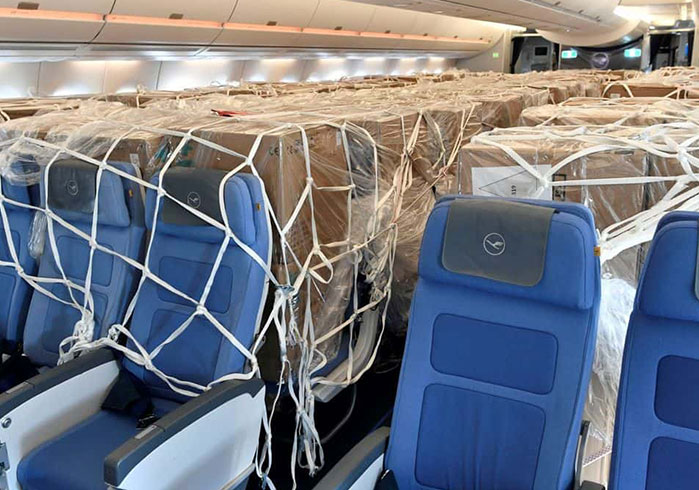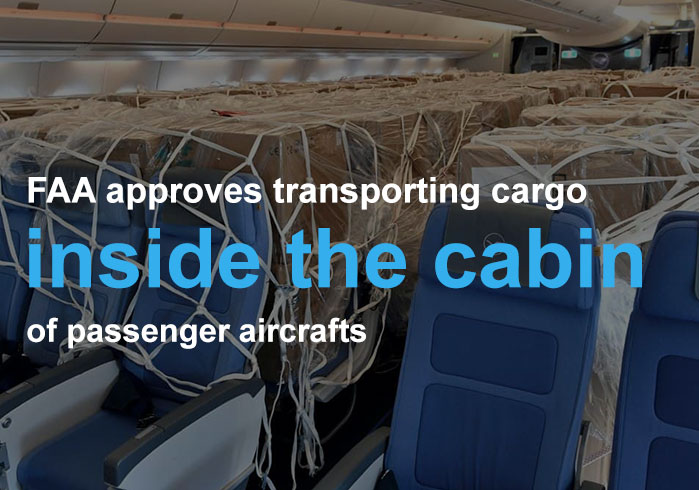
U.S. airlines are beginning to fill their seats not with passengers but with cargo. The FAA has recently approved cargo to sit in the seats once occupied by sleepy travelers to continue shipping goods where they need to go while also helping multiple areas of the economy, Airlines included.
The New FAA exemption
US airlines are set to temporarily fly their planes with cargo in the seats instead of passengers. Domestic passenger carriers were once largely restricted to loading freight only in the lower hold where shipments and baggage would normally go up until two months ago. But recently the Federal Aviation Administration has issued an exemption that now allows cargo to fill the entirety of the plane including the seats.
The Hong Kong Civil Aviation Department has recently approved to use passenger cabins for cargo. Airlines are now loading boxes through the passenger door on Boeing 777 passenger Jets and then securing them to the seats manually. Emirates Airlines out of Dubai has begun to stow cargo in storage bins and seats for their Boeing 777 extended range jets.
These exemptions still have conditions. For every aircraft that maintains the physical seats inside the airline there is a weight limit of 50 pounds per seat. Every box that is stored under a seat has a weight limit of 20 lb per space. The FAA requires extra fire extinguishers on board as well as a minimum of two crewmembers riding inside the cabin with the cargo to detect any potential fires and extinguish them. There must also be an empty row inside of twin-aisle planes so that crew members have access to both sides of the stored cargo.
Airlines have requested a 2-year break from the current regulations. The FAA however only offered the exemption through the remainder of 2020. The petition was filed on behalf of Airlines for America after which the FAA determined that the exemption was justified.
Justification for the exemption
The justification was primarily the need to ensure critical shipments for COVID-19 were not delayed even though passenger flights were suspended. It’s important to understand that regular passenger flights have always had cargo loaded to the bottom next to the suitcases so when goods need to get quickly from one country to another or one state to another, domestic or International Airlines are a great resource. But when those airlines are no longer flying because they have suspended passenger flights, it causes a severe capacity shortage of shipments.
By making an exception and allowing airlines to use the seats to store cargo, the sustainment of critical infrastructure and goods needed for COVID-19 are now able to ship when and where they are required during this public health emergency. Bear in mind that these flights are no longer occupied by passengers at all, leaving the entire aircraft for boxes of goods.
COVID-19 has impacted worldwide economies and will continue to do so. With stay-at-home orders issued by multiple states and countries as well as fluctuations in the confirmed COVID-19 cases as well as degrees of quarantine, airlines are taking quite a big hit. Having to completely cancel flights or being unable to fill enough seats to cover the cost of fuel for overseas flights, in particular, is one of the biggest justifications behind this decision.
Customers around the world are facing issues with orders that they placed in some cases before the US-based stay-at-home orders went into effect given that different components in dozens of products might be manufactured in multiple places around the world and thus must rely on international shipping to get from the point of manufacturing to the customer. As orders change and governments restrict flights, there are even nations like Japan that are completely restricting cargo flights to places like the United States, causing a series of problems for shippers and customers alike. But, this exemption is one way around it.
How airlines are adjusting
Right now airlines are even considering the extended use of this technique long after the COVID-19 public health crisis is over, given that depressed passenger airlines could remain for months, even years after the health crisis is officially over because of a struggling economy.
The airlines are not yet satisfied though. The airlines have still submitted petitions to remove passenger seats from the aircraft so that cargo can be loaded directly on the floor and not in the seats. Right now over 150 airlines are using these freighters, colloquially referred to as ghost freighters.
While the FAA just recently allowed for the exemption, International Aviation Authorities responded much faster to allow this type of cabin modification. For the last several weeks International Airlines like Lufthansa, Virgin Atlantic, Air Canada, and Icelandair have been loading cargo into the seats. By removing the seats, airlines can add 30% more volumetric capacity which equates to six or seven additional tons of cargo. This is particularly useful when lightweight gloves, goggles, and protective medical gear can be loaded in larger quantities.
Airlines like United Airlines have begun to store lightweight pieces in the overhead bins, under the seats, and in storage closets, while they use the slots on the back of seats for mail pouches. Delta Air Lines has sought to gut the interior of their planes to make room for larger pallets while both Alaska Airlines and American Airlines are trying to implement additional ghost flights.
Wrapping Up
Overall, these changes are continuing to evolve, as are how airlines are transporting cargo, modifying their planes, and working together. The FAA continues to change the safety requirements and approve continued requests by airlines which means that the use of airlines for additional freight may very well become a normal process in the future.




